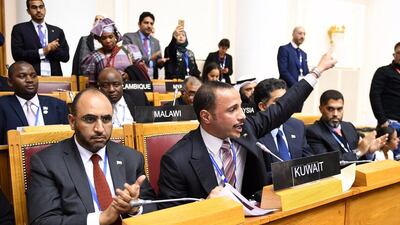Held in St Petersburg, it was supposed to bring together representatives from parliaments around the world to encourage cooperation and promote the principles of international law.
But the behaviour of Israel’s Knesset members at the Inter-Parliamentary Union Assembly on Wednesday sparked scenes far from what the organisers had hoped for.
The speaker of Kuwait’s national assembly launched a tirade against Israel’s delegation after they used the forum to discuss the imprisonment of Palestinian politicians.
Marzouq Al Ghanim turned on his microphone and accused the two Knesset members attending of being “occupiers and murderers of children”.
“You should grab your bags and leave this hall as you have witnessed the reaction of every honourable parliament around the world,” he said, adding that the Israeli delegation “represents the worst form of terrorism — state terrorism.”
Knesset members Nachman Shai and Sharren Haskel duly obliged after the hall in St Petersburg erupted in applause from Mr Al Ghanim’s comments.
The incident took place on the final day of the five-day conference, which brought together delegates from 150 countries. It also comes as the Israeli occupation of Palestine has led to heightened tensions in a number of global bodies, including UN agencies.
Mr Al Ghanim, the former head of the Arab Parliament Union, has led a two-year effort to oust the Knesset from the Inter-Parliamentary Union.
He said in March that Israel’s building of settlements and the legislature supporting the move disregards the UN Resolution 2334 that states settlements have no legal validity and violate international laws.
“The UN has taken action and so should we,” he said.
_________________
Read more:
Israel: No peace talks with Palestinian government reliant on Hamas
Conservatives make strong showing in Kuwait parliamentary election
Kuwait MPs draft law to block price increases
_________________
Kuwait opened its doors to more than half a million Palestinians after the first intifada in the late 80s and early 90s.
Palestinians in Kuwait were heavily involved in the rapid modernisation of the country forming a class of educators and experts with government know-how.
Former Palestinian Liberation Organisation leader Yasser Arafat was given refugee status in Kuwait where he formed the Fatah political organisation.
However, Mr Arafat’s alignment with Saddam Hussein during the Iraqi invasion of Kuwait led to a breakdown in relations between the PLO and the Kuwaiti government and prompted a mass exodus of the remaining 200,000-strong Palestinian diaspora who feared prosecution.
Palestine and Kuwait have since worked to repair relations and the number of Palestinians living in Kuwait today is around 80,000. A new Kuwaiti law passed by parliament to hire Palestinian teachers has been regarded as a positive move to improve Kuwait's state education system.
Kuwait has maintained policies that support the Palestinian cause as per a law that refuses any Kuwaiti entity to provide service to or enter agreements “with entities or persons residing in Israel or with Israel citizenship”.
Kuwait's permanent representative to the UN, Mansour Al Otaibi, said in a speech to the UN Security Council meeting on Wednesday, that Israel’s occupation of Palestine was the top Arab concern.
He called for a “clear time frame for the completion of negotiations between Palestine and Israel to reach a two-state solution".

